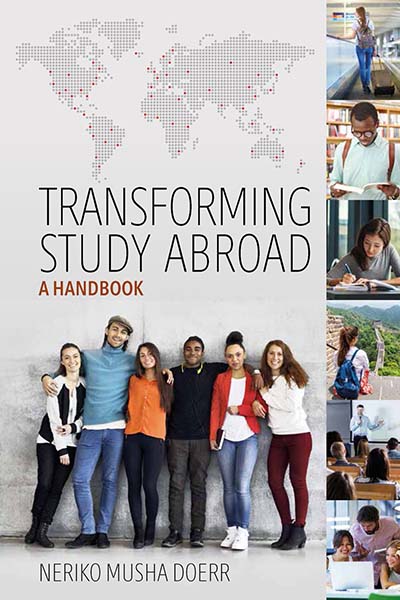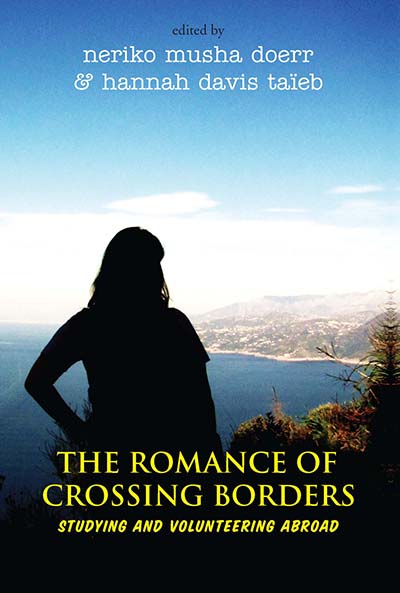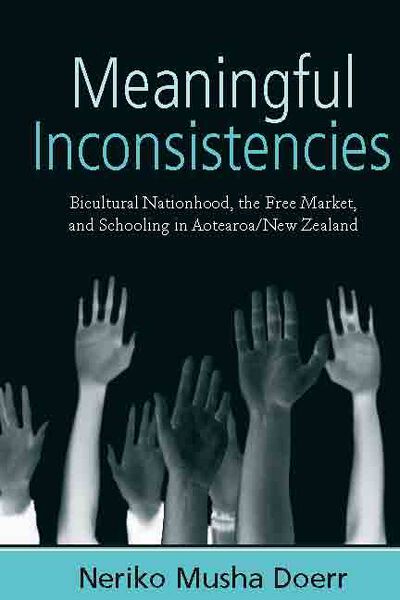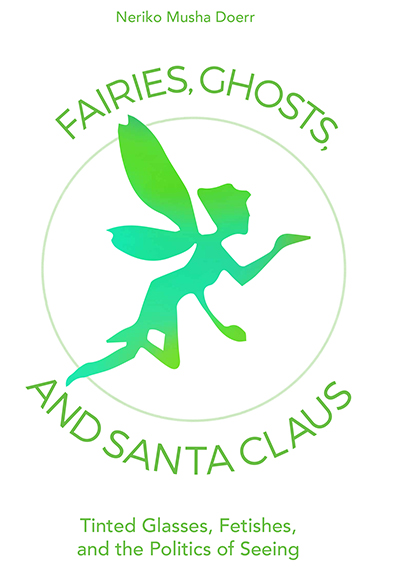
Neriko Musha Doerr is Assistant Professor at Ramapo College. Her publications include Transforming Study Abroad: A Handbook (Berghahn, 2020), The Global Education Effect and Japan: Constructing New Borders and Identification Practices (Routledge, 2020), The Romance of Crossing Borders: Studying and Volunteering Abroad (Berghahn, 2017, with Hannah Taïeb), and Meaningful Inconsistencies (Berghahn 2009).
Thank you for joining us, Professor Doerr. Can we begin with a quick survey of your studies and main research interests to date?
Thank you for inviting me to be here. My research interest was originally the cultural anthropology of nationalism, as I studied in graduate school under John Borneman and Benedict Anderson, who both worked on nationalism, and Jane Fajans whose specialities are on Oceania. But because I chose to do ethnographic research at a school with a Māori-English bilingual unit in Aotearoa/New Zealand for my doctoral dissertation, my research interest expanded to educational anthropology and linguistic anthropology. So, nationalism and related race politics in education and language practices run through all my research.
The site selections in my post-doctoral research had mostly to do with juggling my work and my other responsibilities. After receiving my PhD, I did research in English-as-a-Second-Language classes at a community college where I was teaching part time.
I then did ethnographic fieldwork at a weekend Japanese language school for four years, where my two children attended. After that, I did research on study abroad and alternative break trips from the college at which I taught—this was my work on experiential learning. I also did research on civic engagement in my classes as a part of developing new pedagogical approaches. Besides these main research activities, I collaborated with Japanese-as-a-Foreign-Language professors in analyzing their pedagogical innovations. I did some fun projects like analyzing TV shows, the reception of a musician, and Pokémon GO. In all this research, I’m looking at race and language politics and relations of power. I often draw on the works of Michel Foucault, Louis Althusser, Judith Butler, among others.
What’s the significance of the fairies, ghosts, and Santa Claus of the title?
This new book is about the things we used to “see” but have grown out of, the things some of us “see” depending on our viewpoints, and the things we “see” but ignore—willful ignorance. I investigate what makes us “see” as well as the effects of this seeing. In each chapter, I connect my analyses to something we may or may not “see,” using different analogies to symbolize each situation. The fairies in the title come from the famous photographs called “Cottingley Fairies,” taken in Victorian England by two teenagers. The photos pictured little fairies flying around one of the teenagers’ face. Some argue that these photos “killed” the fairies because fairies live in our fantasy world and are not supposed to be “seen” (i.e., “captured”) in that way. I connect this domesticating effect to the risk of overanalyzing linguistic landscapes in one of the chapters.
The ghosts come from a chapter where I analyze the production of what I call “Phantom Japan” at a weekend Japanese language school in the US, where Japan’s complexity is ignored (even though people are aware of it). I liken this to the notion of samurai—the minority elite caste that no longer exists, hence “ghost”— as a symbol of current Japan.
Santa Claus comes from the chapter in which I analyze commodity fetishism; how we see Santa but not his elves’ (or really the parents’) labor, even though we are aware of their work behind the scenes. Other chapters discuss how we can see different things in the same item depending on our viewpoints, which are then connected to figures like the “holy mouth man” (a dentist being exoticized in a parody of ethnographic works), Dr. Jekyll and Mr. Hyde, and seeing either Maui’s fishhook or Scorpio in the same constellation of stars. I used these items so that the reader will get an affective aspect of my discussion—we often understand things better if we can “feel” them. And I think it’s more fun that way. I couldn’t put these all in the book title, so I chose the ones that probably represent our romanticization or fear of seeing things that may or may not exist.
How does your new book relate to your previous work on study and education?
This book revisits various fieldworks I have done in the past and re-analyzes them in terms of the politics of vision—what we see but pretend that we don’t—by using Slavoj Žižek’s notion of fetish and Walter Benjamin’s notion of the optical unconscious. So, each chapter discusses different fieldworks that I have done. As I mentioned, I talk about my fieldwork at a weekend Japanese language school in the US as pushing us to see the transplanted “Phantom Japan” that masks its complexity, though we are aware of it. From my previous works on study abroad, I look at common discourses in visiting Third World countries, where people say, “they are poor but happy,” and in testimonials that state “I was so transformed.”
In this volume, I discuss what these statements hide in plain sight or coax us to see, as well as what they push us to do as a result.
I revisit class projects that I have carried out—students interviewing someone with the opposite political viewpoints, or investigating linguistic landscapes in minority language, or tracing where a mundane product came from. I discuss how these projects revealed hidden complexities but also suggested other things. That include the importance of not over-seeing things and the importance of shuffling between seeing (i.e., being aware) and not seeing (i.e., having space for an escape) in creating effective action. I also re-interpret two groups of students seeing different things in the same experience in an alternative break trip as modelling a way to create unity within diversity. Ethnographic fieldwork is usually very layered because it’s holistic, so focusing on new aspects of it with a new analytical lens is a lot of fun for me. This book is about that.
Naturally we need to read the book for the full picture, but could you briefly introduce the concepts of “tinted glasses”, “unit-thinking” and “coherants”?
The concept of tinted glasses represents the filter you use to see the world. I usually use the example of new drivers or X-ray technicians. Once you learn to drive, you notice new things on the road that relate to driving regulations that you may not have noticed as a pedestrian. So, that’s the new set of tinted glasses. You are looking at the same road but seeing different things depending on what tinted glasses you have gained (these tinted glasses of drivers is my next research topic!). X-ray technicians also have their own tinted glasses that allow them to see a tumor in what seems to the untrained eyes just a chaotic blob of things.
Unit thinking is a kind of tinted glasses that pushes you to see the world as made up of discrete, bounded units. For example, color is really a spectrum, but unit thinking pushes us to see separate discrete colors of red, green, blue, etc. Digital clocks push us to see flowing time as made up of discrete units of minutes, as opposed to analogue clocks that show the continuous flow of time with the second hand. A more important kind of unit thinking is what I call “normative unit thinking,” which has more serious effects. This includes the unit thinking of people that divide up diverse people into nations, races, or ethnic groups that make them appear as discrete, internally homogeneous units. Culture and language also involve such normative unit thinking. They are normative because they are conducive to certain policies and actions that force people to conform, such as assimilation and language standardization. Considering the brutal history that has accompanied such policies and actions, in this book I advocate for a framework that replaces unit thinking, such as that of multi-scalar networks that acknowledges the diverse networks that each individual has, for example, that are not conducive to such normative impulses.
Coherants, with an “a” to show that it is an agent (like a “coagulant”), are devices within unit thinking that gives a fluid spectrum of things the appearance of discrete units. So, color wheels or digital clocks (as opposed to analogue clocks) are coherants. The census and any occasion that asks people to check a “race” box are coherants. Language dictionaries and grammar books are coherants.
My book talks about unit thinking as a set of tinted glass and examines the coherants that create unit thinking. A Japanese language school that teaches “Japanese language,” study abroad that is portrayed as an adventure into the unknown, the political setup of left vs right, mundane commodities, and civic engagement projects that divide the “helper” and the “helped” are some of the coherants I discuss in this book.
And your discussion of the ‘politics of vision’ also draws on the “optical unconscious” and on “fetishism”. How do these affect what and how we see?
I like the notion of fetishism that Žižek uses, which frames fetishism as the dual process of seeing and going along with the simplistic façade of things while knowing the complexity that it hides. For example, we all know that there are many different kinds of Japanese people, and yet we talk about “Japanese people” as if they all think and act the same. We know various commodities have some problematic labor relations or environmental impacts in their production processes, and yet most of us continue to buy them (my students’ research show there is almost nothing that does not have any of these issues). So, what we need is not just to “raise awareness,” because aware people continue to act the same—willful ignorance.
We need to investigate and understand how and why we continue this willful ignorance so that we can explore more effective ways to tackle social problems, such as shifting our focus to uneven structural arrangements besides individual consumer practices.
Benjamin’s notion of the optical unconscious—things that the invention of photography allowed us to see—helps me theorize the part of fetish that we do not see and what happens if we see it or see it but pretend not to see it. However, I modify his concept by providing more complexity to it, such as the effects of diverse and layered subject positions.
How can “spectacle pedagogy” help to transform the world?
I am hoping that my book will help plant a seed of noticing certain things that we did not before. Spectacle pedagogy aims at letting students be aware of what I argue throughout the book—that we actually see the complexity and problems of the world, yet we go along with the simplistic façade of things and that we do need that area of simplicity in order to have space to contemplate things at another level, or even breathe and rejuvenate, wherever you are positioned within the social hierarchy. However, we do not want everyone to stay on this simplistic, façade level all the time. So, this book and its suggested spectacle pedagogy is a call to start thinking about what to do from here based on this acknowledgement, with the book providing some attempts at doing so.
That is, when we see problems, we tend to go for “let’s educate.” But my book is saying that that’s not enough. Instead of stopping at “raising awareness,” try to understand what happens after awareness is raised and explore how changes can really be brought about. The aim of spectacle pedagogy is thus to discuss the politics of vision to which Žižek’s notion of fetish alerts us and to search, with students, for ways to bring out changes beyond the willful ignorance that “raising awareness” may encourage.
You also discuss your plans to proactively reach wider audiences in different ways. What forms will these take and where can we find them and participate?
I am currently writing a book for practitioners in study abroad, civic engagement, and language education, in which I suggest possible approaches and projects that would overcome unit thinking. It is tentatively called “Post Unit Thinking and Paradoxes of Difference: Multi-Scalar Networks, Fetishes, and Other Alternative Frameworks” and hopefully I can submit it for publication by early 2023.
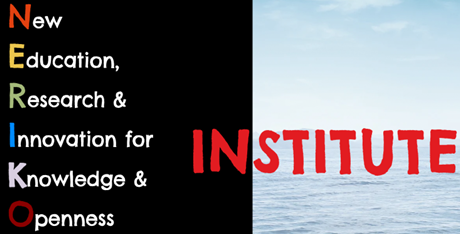
Also, I established a forum called NERIKO Institute (NERIKO stands for New, Education, Research, and Innovation for Knowledge and Openness), which aims at connecting people with diverse expertise to collaborate on various projects. There are several topics listed, and one of them is post unit thinking projects (others are “distancing” to overcome the unit thinking in politics of difference and “new civic engagement”).
The one I am currently working on is a project called “Beyond Unit Thinking” with two Japanese-as-a-Foreign-Language professors, Kimiko Suzuki (Haverford College) and Jisuk Park (University of Toronto). We are developing workshops and booklets for Japanese language instructors, introducing and supporting them in exploring concrete ways to teach language without further perpetuating the unit thinking of language. We are submitting a panel to pilot the workshop as a panel discussion at the annual spring conference of American Association of Teachers of Japanese in Boston on March 16, 2023.
We will be piloting the workshop also on August 17-18, 2023, at the annual conference of the Canadian Association for Japanese Language Education, where I will serve as the keynote speaker. Another occasion is when I will carry out a workshop with Prof. Kimiko Suzuki for students after I give a lecture as a distinguished lecturer at Haverford College this fall. We are making booklets to go with such workshops and are hoping to create workshop packages—with the three of us leading the workshop or just providing resources.
NERIKO Institute’s Post Unit Thinking Projects also include working with musicians—I am currently working with a young talented musician, Cranston Dean, to write songs that reflect the idea of going beyond unit thinking—and children’s books on the topic with a local artist. I am also planning to create small grants for researchers and practitioners as a way to call for participation in creating post unit thinking projects together in various areas, working independently or in groups, and publishing theoretical works as well as practical booklets together.
Who do you hope will benefit most from reading your work?
The project as a whole is aimed at people who want to make changes in the world and want to explore more effective ways to do so. There is the band-aid type of doing so, and there are ways to create change at a deeper level, transforming wider structures, such as legislations and regulations. I believe both are important, although we do need to focus on the latter in the long run. This book aims to go even further, to think about the worldviews—unit thinking—that background many of the things we do and think. For example, language education as is set up now in the schooling system is based on unit thinking, making it difficult to challenge the standardization impulses even if we try to do so through pedagogical innovations. I believe that the apprenticeship type of language learning works the best for challenging the unit thinking of language, which has been done in language revitalization contexts already for different reasons, such as lack of resources.
So, ultimately, I want everyone to think about and challenge our common-sensual ways of seeing the world—unit thinking—and explore alternative ways of seeing. They do not have to replace their way of seeing fully, but it is good to have alternatives, so we know that unit thinking is not the only way.
As mentioned, this book is part of a wider project on the politics of vision and challenging the prevalent unit thinking. This book is the theoretical base of the whole project and is written for researchers and graduate/upper undergraduate students. It can work as a starting point of theoretical exploration for those who are interested in the politics of vision—how we “see” things and “not see” things. It can also work as the reasoning behind post unit thinking projects for those who are interested in such projects but are not familiar with theoretical discussions and want to learn.
And what’s next for you now?
My next work is on “automobility,” specifically the kind of subjectivity that car drivers learn to develop and how car drivers communicate with each other. The first part has to do with driver education, certification, and changing worldviews, as mentioned earlier, and I will be investigating it as part of educational anthropology and the production of subjectivity. The second part is about how drivers communicate—with other drivers as well as authorities—and survive in the context of lacking clear grammar and vocabulary. From the viewpoint of linguistic anthropology, this practice provides an interesting look into fluid, uncertain, yet somehow possible, communication practices, which may help us theorize language practice models that go beyond unit thinking. I will start with the second one, using many research assistants who will ride in the cars of their friends and families to do participant observation—something I have limited access to. This is a new way of doing ethnography for me, as I usually do not have research assistants. Also, much of the work done on automobility is in the field of geography, and there is little ethnography done on the topic of date. Especially, there is little research done in the topic of education (i.e., driver education) and language (i.e., driver communication).
So, I am excited to see what we will find. Because this is apparently unrelated to my original field—educational anthropology and linguistic anthropology—I’m hoping that whatever I find will give us new angles in understanding the ways we learn and communicate. It is also a topic that can be expanded into various directions, from the use of public road space to the notion of ownership as things like zip-cars develop, which also makes it very exciting to me.
If you want to know more about our books please sign up for our email newsletters in the subjects of your choice.

